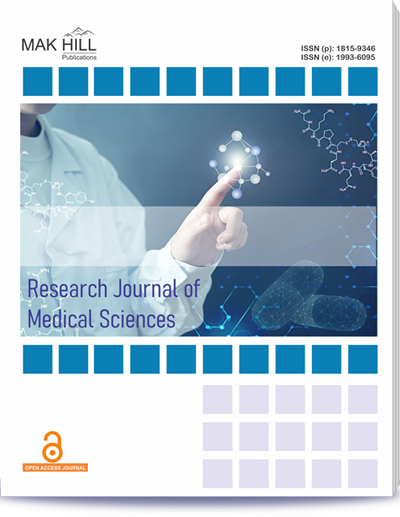
Research Journal of Medical Sciences
ISSN: Online 1993-6095ISSN: Print 1815-9346
Abstract
Polycystic ovarian syndrome (PCOS) is the most common endocrine disorder affecting women in reproductive age group. Vitamin D is thought to influence the development of PCOS through gene transcription. A level of 20ng/ml to 50ng/ml is considered adequate for healthy people. Several studies have reported low level of vitamin D in women with PCOS, with average 25‐hydroxy vitamin (25‐OHD) levels between 11 and 31ng/ml with majority having values less than 20ng/ml (67 to 85%). impact of vitamin‐D supplementation in PCOS and non PCOS patients. An observational, cross‐section, analytical study, conducted in the department of Gynecology and Obstetrics, OPD, Birsa Munda GMC Shahdol for 24 months (1st January 2022‐1st January 2023) in 60 cases and 30 control. The patients satisfying the inclusion criteria were enrolled in the study following informed written consent. History of the enrolled patients was taken in details with special emphasis on menstrual history, history of excessive weight gain, excessive hair growth and acne. PCOS patients ranged from the ages 18‐39 years with a mean (±sd) ae of 27.13±5.59 years. Menstrual irregularities were more common in PCOS women with a mean menstrual cycle per year 5.63±0.78. FBS and Insulin resistance were common in PCOS group with a mean value of 89.03±14.70 gm/dl and 18.15±8.82 IU/ml, respectively. Acne and hirsutism were significantly higher in PCOS women. BMI was more in PCOS group as compared to the Non PCOS group. Mean BMI in PCOS group was 26.89±4.19 kg/m2. WHR was also found to be more in PCOS women. Mean ratio was 0.91±0.11. The prevalence of Vitamin D deficiency among PCOS women attending the hospital was found to be 11.4%. The risk of deficiency or insufficiency of Vitamin D was 4.75 times more among the patients with PCOS as compared to the patients without PCOS. Vitamin D deficiency was more prevalent among obese women. 57.1% of obese women were deficient in Vitamin D levels. Vitamin D was more prevalent among patients with WHR >0.81. PCOS patients are more likely to develop low vitamin D levels as compared to those without it. As obese PCOS patients are at a greater risk of Vitamin D deficiency and its later morbidity, they should be followed up more frequently. Obese PCOS women should be advised about weight reduction by lifestyle changes and dietary modification with the inclusion of high protein calcium and vitamin D rich diet and exclusion of fried and oily food items. A reasonable regime of exercise should be advised to all PCOS patients especially those with more than normal BMI, in order to increase insulin sensitivity. Vitamin D supplements may be considered in treatment of PCOS women having altered vitamin D levels. Insulin sensitizer may be considered in patients with insulin resistance.
How to cite this article:
Subhashini Trivedi, Prakash Chandra Mishra and Teh‐In Chou. Impact of Vitamin‐D Supplementation in PCOS and NON PCOS Patients.
DOI: https://doi.org/10.36478/10.36478/makrjms.2024.8.430.435
URL: https://www.makhillpublications.co/view-article/1815-9346/10.36478/makrjms.2024.8.430.435